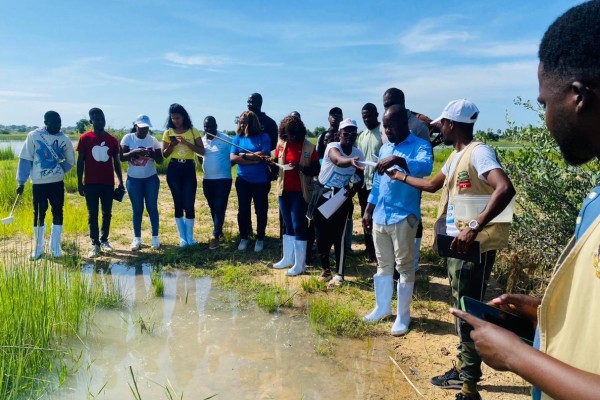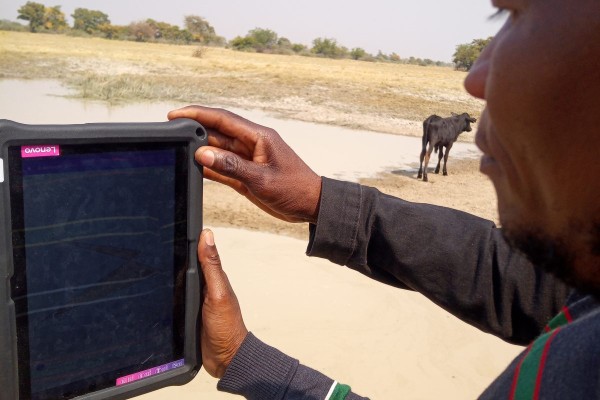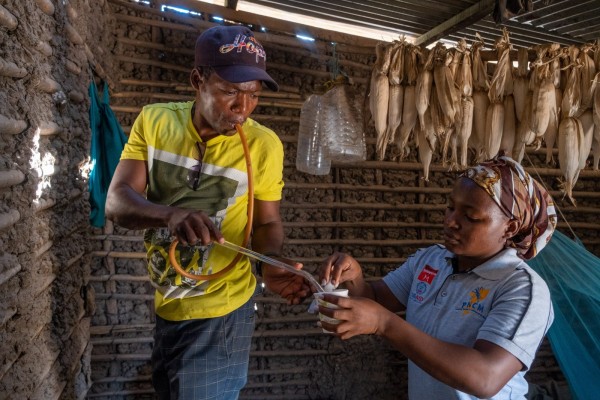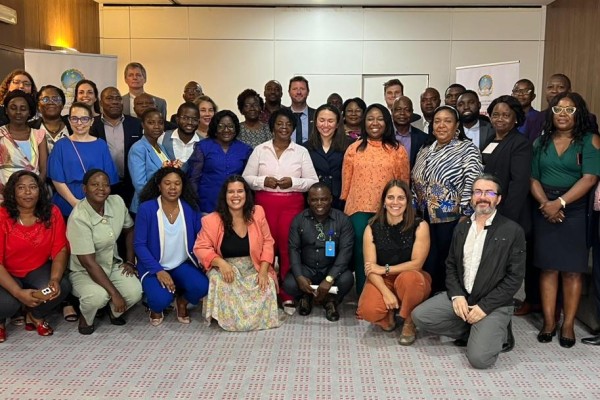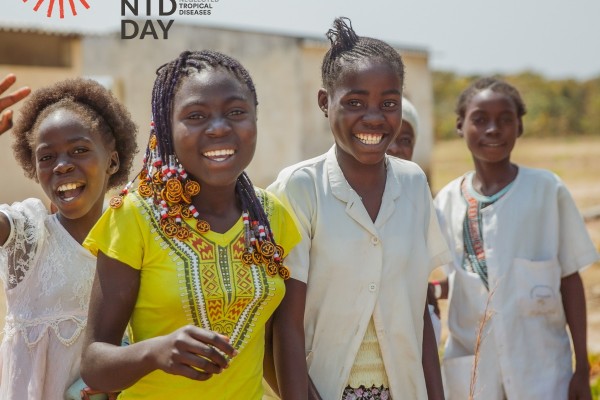Angola has been recovering from a long and devastating civil war that ended in 2002. Investments to infrastructure have improved access to health care. But a lack of trained health workers, and a health system that is spread over vast areas, leave many under-served or with limited and poor quality health care.
Angola is still one of the countries with the highest maternal and infant child mortality rates in sub-Saharan Africa mainly caused by preventable diseases.
The MENTOR Initiative has been supporting malaria, Neglected Tropical Diseases (NTDs) and Water, Sanitation and Hygiene (WASH) programmes here since 2004. Partnering with the Ministry of Health, MENTOR has supported the implementation of operations and provided technical support to different disease programmes in the country.
We currently operate in 11 provinces out of 18 supporting local health workers and health managers to expand the reach of life-saving interventions for malaria and NTDs.
Main activities:
- Mass Drug Administrations (MDAs) target diseases such as soil-transmitted helminthiases (STH), schistosomiasis (SCH), lymphatic filariasis (LF) and onchocerciasis. Since 2014, MENTOR has supported the delivery of over 20 million treatments for these diseases.
- Training and supporting Community Health Workers to diagnose and treat malaria cases.
- Indoor Residual Spraying (IRS) provide protection from malaria to close to a million people (over a three-year period).
- Support NTD mapping exercises, improve quality of reporting and strengthen malaria surveillance to collect and use data effectively, and contribute to the gradual progression towards disease elimination.

Neglected Tropical Diseases (NTDs)
In 2021, The MENTOR Initiative completed a seven-year cycle supporting three provinces with routine Mass Drug Administration Campaigns (MDA) and Water Sanitation and Hygiene (WASH) interventions to tackle NTDs.
An impact assessment showed progress against WHO targets to eliminate schistosomiasis and soil transmitted helminths as a public health problem. MENTOR supported MDA implementation across nine provinces and technical support to central and provincial level NTD programmes.
Since 2014, MENTOR was able to support the Angolan NTD programme deliver MDA campaigns with funding from The END Fund. These have provided more than 20 million treatments for diseases such as schistosomiasis, soil transmitted helminths, onchocerciases and lymphatic filariasis.
Innovative NTD control
MENTOR has also been a key partner in innovative and community driven approaches to NTD control. With support from The End Fund, a DHIS2 reporting system has been developed. This collects data using this platform to contribute to data integration into national Angolan health information system. This work has helped to improve data quality and better stock control.
MENTOR has also supported the NTD programme through engaging with local community and church leaders to mobilise children and adults for MDA activities. This has contributed towards a significant increase in the proportion of non-enrolled school aged children that receive treatment.
MENTOR provides significant support to ongoing efforts to map the country for some of the NTD and contributed to 2014, 2019 and 2021 schistosomiasis and soil transmitted helminths exercises.
Logistical and technical support to lymphatic filariasis and onchocerciasis mapping in 2017, and ongoing trachoma mapping, is aiming to improve the understanding of disease endemicity in Angola.
Water, Sanitation and Hygiene (WASH)
Since 2015 WASH programmes in schools have been successfully set up in Huambo, Zaire and Uige as part of an integrated approach to NTD control. The WASH programme integrated work on hygiene practices among school children, waste management and equipment for making tippy taps (basic hand washing station).
The programme provided WASH equipment and trains teachers in techniques to improve school-based hygiene and handwashing in 2,034 schools across the three provinces.
In 2022, MENTOR responded to the severe drought in southern Angola supporting with emergency water supply and hygiene promotion amongst the most affected areas. Funded by UNICEF, more than 150,000 people gained access to safe water, and more than 190,000 people were reached with key messages on hygiene and Infant and Young Child Feeding (IYCF) practices.
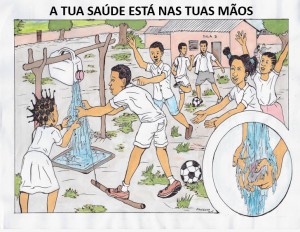
Malaria Control
The entire Angolan population is at risk for malaria. According to estimates published in the 2021 WHO World Malaria Report, Angola saw at least 6.6 million malaria cases and 11,000 malaria-related deaths in 2020.
Malaria in Angola accounts for 35% of mortality in children and 40% of pre-natal mortality. It is still the main cause of school and work absenteeism in the country.
The country has diverse transmission patterns with high transmission across most of the provinces. But it registers a low and scattered transmission pattern in southern, bordering districts of Cuando Cubango and Cunene provinces.
Under the USAID funded Health For All Programme, MENTOR has been working with PSI across the northern provinces of Zaire and Uige, providing a strong platform for sustainable outcomes in malaria case management.
MENTOR has been training and supporting health workers to diagnose and treat malaria cases more effectively, and improve the ability of laboratories to diagnose malaria.
MENTOR is also supporting the training and supportive supervision of the ADECOS programme (community health workers) in malaria detection and treatment by delivering training programmes to selected municipalities in Zaire and Uige.
Since 2017, MENTOR supported the training of more than 2,500 health workers on malaria case management, including:
- 311 doctors
- 1,424 nurses
- 492 antenatal care nurses
- 434 lab technicians.
MENTOR has been supporting the use of data visualisation tools for decision making at district and provincial level. As recommended by WHO, surveillance needs to be at the core of malaria programming.
MENTOR supported several data discussion meetings to analyse and discuss data outputs, and make action plans tailored for each district. This ‘data to action’ approach is transforming the way local decision makers look at the importance of using data for day-to-day planning and resource allocation exercises.
Elimination
In Southern Angola MENTOR has been supporting the National Malaria Control Program (NMCP) to contribute to malaria elimination in the region. Supporting direct delivery of projects along the southern border with Namibia and Zambia (Cuando Cubango and Cunene provinces) MENTOR has been working in partnership with Elimination 8 to improve surveillance, case management and vector control components of the programme in these areas.
Indoor Residual Spraying
Since 2018, MENTOR has been supporting the implementation of Indoor Residual Spraying across districts of Cuando Cubango and Cunene. It is estimated that nearly 924 375 people have been protected with this intervention (2018-2021) – a significant contribution to malaria incidence reduction in the region and in neighbouring countries.
Surveillance
In 2019, MENTOR started to support the implementation of key surveillance activities grounded in three main areas:
- improve data quality (retrospective and prospectively),
- improve the capacity to handle and use data from all involved in the surveillance system, and
- use data for decision making.
This has led to significant improvements in data availability and quality across areas where MENTOR operates. These improvements are key to initiate active surveillance approaches, as good data driven decision making can only start once quality data exists.
MENTOR is a key partner of NMCP piloting new surveillance tools focused on malaria surveillance for elimination approaches. Development of guidance and learning from piloting these approaches is key to ensure gradual uptake of active surveillance approaches in areas of low transmission.
Training
In 2022, recognising the impact of the Covid19 pandemic on the health system, MENTOR supported the full-scale training of 301 health workers across Cunene and Cuando Cubango provinces – 15 laboratory technicians, 46 ANC nurses, 49 doctors and 155 nurses.
Training focused on malaria case management content and aimed to ensure all health workers in the region were trained or refreshed on key components of disease management.
Training for 36 new trainees also took place to promote skills at provincial level. New and existing community health workers in bordering districts were also trained, accounting for a total of 210 ADECOS working in the communities since May 2022.
In Benguela and Cuanza Sul provinces, MENTOR is also supporting a long-term entomological surveillance programme to build skills capacity for local district staff. The programme, in partnership with World Vision Angola routinely collect and analyse mosquito samples in five sentinel sites across these two provinces for a period of three years. This provides key information on vector presence, behaviour and insecticide susceptibility patterns in the region.

Looking ahead
As the Angola health system gradually improves, MENTOR will continue to support the Ministry of Health focussing on improving appropriation, integration, sustainability, and evidence-based practices. MENTOR will provide this support across:
Malaria
Case management – improving health workers capacity through training and supportive supervision in northern and southern provinces.
Vector control – providing vector control interventions rooted in quality entomological surveillance data.
Surveillance and Monitoring and Evaluation is now a cornerstone to malaria programming. MENTOR will continue to support data driven decision making across all transmission settings in Angola, whilst also supporting active surveillance activities in areas targeted for elimination
Community health is central to ensure access to good malaria case management, uptake of vector control measures and improved surveillance. MENTOR will continue to support community health workers across the country.
Neglected Tropical Diseases
As a key NTD Programme partner, MENTOR will advocate and support the scale up of MDAs to all endemic areas and all preventive chemotherapy diseases to enable the elimination of these diseases.
Central and provincial level support and capacity building in areas of programme management, supply chain, monitoring and evaluation will continue to be a central part of MENTOR’s support.
WASH
MENTOR will continue to support efforts to integrate WASH into NTD and malaria programming, whilst also responding to emergency needs in areas affected by drought or population movement.
Last updated January 2023

